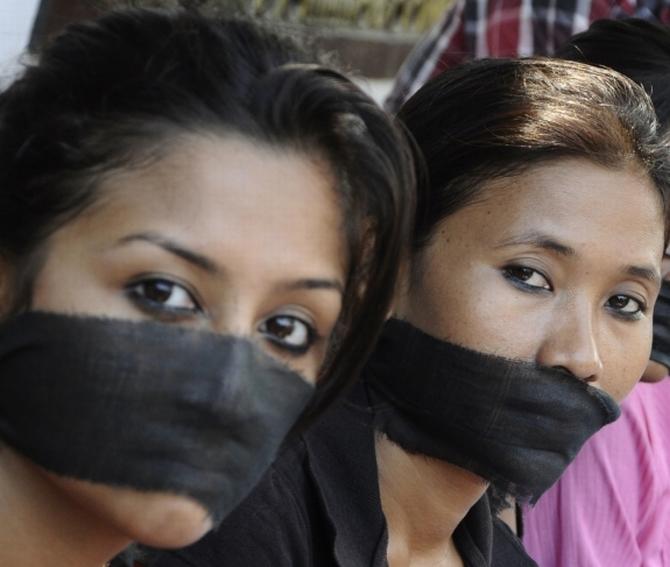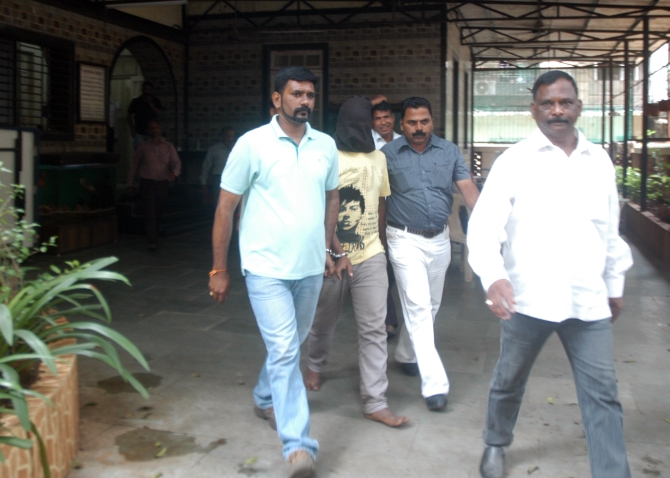Photographs: Reuters
India can work with the existing rape laws, but what’s important is timely implementation, experts tell Vicky Nanjappa
Following the gang rape in Delhi, there was talk about fast tracking cases of this nature to ensure a better conviction rate. This with the hope that quick action will act as a deterrent. Last week’s rape of a Mumbai photojournalist has fuelled this debate once again.
The latest statistics by the National Crime Records Bureau on conviction in cases related to rape and other sexual crimes are not promising. Legal experts and women’s rights activists say that India can work with the existing laws, but it’s redundant if not implemented on time.
| State | Number of incidents | Conviction Rate |
| Madhya Pradesh | 3406 | 3.6 per cent |
| West Bengal | 2363 | 11.5 per cent |
| Uttar Pradesh | 2042 | 56.4 per cent |
| Rajasthan | 1800 | 26.1 per cent |
| Maharashtra | 1701 | 20.3 per cent |
| Assam | 1700 | 23.3 per cent |
| Andhra Pradesh | 1442 | 11.0 per cent |
| Kerala | 1132 | 15.4 per cent |
| Odisha | 1112 | 23.2 per cent |
| Chattisgarh | 1053 | 24.5 per cent |
| Bihar | 934 | 24.8 per cent |
| Jharkhand | 784 | 39 per cent |
| Haryana | 733 | 23.4 per cent |
| Tamil Nadu | 677 | 20.4 per cent |
| Karnataka | 636 | 19.8 per cent |
| Delhi | 572 | 41.5 per cent |
| Punjab | 479 | 36.3 per cent |
| Gujarat | 439 | 14.7 per cent |
| Jammu and Kashmir | 277 | 8.3 per cent |
| Himachal Pradesh | 168 | 22.3 per cent |
| Meghalaya | 130 | 0 per cent |
| Uttarakhand | 129 | 54.5 per cent |
| Mizoram | 77 | 80.7 per cent |
| Manipur | 53 | 100 per cent |
| Arunachal Pradesh | 42 | 17.4 per cent |
| Goa | 29 | 28.6 per cent |
| Chandigarh | 27 | 42.9 per cent |
| Nagaland | 23 | 84.2 per cent |
| Sikkim | 16 | 55 per cent |
| Puducherry | 7 | 1.1 per cent |
| Dadra and Nagar Haveli | 4 | 0 per cent |
| Daman and Diu | 1 | 0 per cent |
(The above statistics are in order of the most number of rape cases registered.)
...
'Fast tracking of rape cases has slowed down'
Image: Mumbai gang rape case suspect being produced before a court in MumbaiPhotographs: Sahil Salvi
Senior Advocate K V Mohan pointed out that statistics act only as a reminder, but they do nothing to improve the pendency level. “Following the outrage after the Delhi gang rape in December last year, courts began fast tracking the cases. However, the pace has slowed down again,” he said.
While the courts are understaffed, there are other issues leading to the high level of pendency. According to Mohan, there are a large number of false cases filed by women to avenge men who may have jilted them. The courts have to deal with such cases carefully and day-to-day hearings often delay the outcome.
“Courts cannot differentiate between cases based on what the media decides to highlight. All cases are equal before a court and taking matters out of turn is not justice,” the advocate added.
…
'Saying 'don't dress in a particular way' is not a solution'
Image: Women take part in a demonstartion against rape and sexual crimesPhotographs: Reuters
Meenakshi Ganguly of Human Rights Watch said that terming places as rape capitals on mere statistics was not the answer. “From the deterrence point of view, when the existing laws become more effective, they will send a strong message. Take for example the drunken driving and seat belt rules implemented by the police. When these drives were taken up seriously things fell in place to a large extent; the public response was good,” she said.
“We need to speak about how to protect instead of giving suggestions. Do not go out, do not dress in a particular manner are not the solutions. Better policing, street light implementation are some things that could be done to help out in such cases,” Ganguly suggested.
“Politicians do have an important role to play. There should be absolutely no compromise in the protection of women. She has the right to work and move freely. Firstly, politicians should stop blaming the survivor. Secondly, they should stop diluting the issue on religious and ethnicity issues. A rape is a rape whether it is carried out by a migrant or a local. Our leadership needs to be very clear,” she added.
“I personally feel that the implementation of the law is very important for the problem to be solved. While we do agree that the police is understaffed and cannot be everywhere at all times, the other point to be noted is that dereliction of duty when something could have been done should be dealt with severely,” opined Ganguly.




article